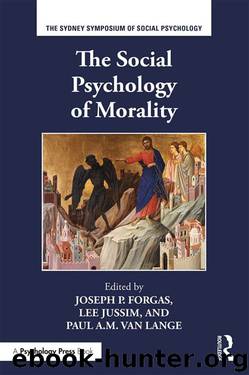The Social Psychology of Morality (Sydney Symposium of Social Psychology) by Unknown

Author:Unknown
Language: eng
Format: epub
ISBN: 9781138929067
Publisher: Taylor and Francis
Published: 2016-01-29T05:00:00+00:00
Mood Effects on Willingness to Accept Unfair Decisions in the Ultimatum Game
Experiment 5 was designed to show that mood can also influence the degree of fairness recipients are willing to accept in the ultimatum game (Forgas & Tan, 2013b, Exp. 2). If negative mood indeed promotes more accommodative and norm-aware processing, responders in a negative mood should be more concerned with fairness norms and thus be more likely to reject unfair offers. In contrast, according to informational models, positive affect should increase confidence and assertiveness and the tendency to reject unfair offers. Thus, analyzing mood effects on the behaviour of respondents will allow a direct evaluation of the differential predictions of informational and processing theories of mood effects.
The same procedure was employed as in Experiment 4, but this time all participants (N = 90) were ‘randomly’ allocated to be responders rather than allocators. The same mood induction procedure was employed. Each participant received four offers of different levels of fairness (2, 3 or 4 out of 10 points) in four consecutive allocation trials by two male and two female proposers in a random order, and indicated their decision to accept or reject each offer. The experiment employed a 2 × 4 mixed design, with mood (positive, negative) and fairness offer type (2, 2, 3 or 4 points) as the independent variables and acceptance rate as the dependent variable. The mood induction was again highly effective, as those in the positive mood condition rated their mood as significantly better than did those in the negative mood condition, F (1,88) = 176.31; p = .001 (M = 4.88 vs. 2.69). An ANOVA of responders acceptance or rejection of allocations found a significant mood main effect on acceptance, F (1,88) = 4.55; p < .05. Overall, 57% of those in negative mood rejected unfair offers compared to only 45% in the positive condition (see Figure 10.4). This mood effect was most marked in reactions to the less fair, 2- and 3-point offers, but disappeared for the most fair 4-point offers, accepted by 98% of respondents.
Acceptance for unfair offers of 2 points was low, but acceptance gradually increased as offers became more fair (26%, 48% and 98% for the 2-, 3- and 4-point offers, respectively). No significant mood by offer size interaction effect was found, F (3,88) = 1.41, p > .20. This result confirms that rejections were consistently higher in negative than in positive mood, a finding that clearly supports processing theories that predict that negative mood should increase and positive mood reduce attention to external fairness norms. This pattern is not readily explained by informational models that imply greater confidence and assertiveness, and higher rejection rates by those in a positive mood.
Figure 10.4 The effects of mood (good, bad) and offer fairness on the acceptance of offers by responders in the ultimatum game.
Download
This site does not store any files on its server. We only index and link to content provided by other sites. Please contact the content providers to delete copyright contents if any and email us, we'll remove relevant links or contents immediately.
Cecilia; Or, Memoirs of an Heiress — Volume 2 by Fanny Burney(31956)
Cecilia; Or, Memoirs of an Heiress — Volume 3 by Fanny Burney(31941)
Fanny Burney by Claire Harman(26602)
We're Going to Need More Wine by Gabrielle Union(19046)
Plagued by Fire by Paul Hendrickson(17412)
All the Missing Girls by Megan Miranda(16023)
Cat's cradle by Kurt Vonnegut(15351)
For the Love of Europe by Rick Steves(14121)
Bombshells: Glamour Girls of a Lifetime by Sullivan Steve(14073)
Leonardo da Vinci by Walter Isaacson(13336)
4 3 2 1: A Novel by Paul Auster(12391)
The remains of the day by Kazuo Ishiguro(8998)
Adultolescence by Gabbie Hanna(8927)
Note to Self by Connor Franta(7670)
Diary of a Player by Brad Paisley(7577)
Giovanni's Room by James Baldwin(7346)
What Does This Button Do? by Bruce Dickinson(6207)
Ego Is the Enemy by Ryan Holiday(5447)
Born a Crime by Trevor Noah(5382)
